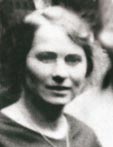| |||
Sabina Spielrein
Carl Gustav Jung
Sigmund Freud |
Sabina Spielrein
appeared several times in the correspondence between Sigmund Freud and Carl Gustav Jung, yet there was very little information about her. She came from Russia and was Jung's first analysis-patient in the Burghölzli clinic in Zürich. After successful treatment, (Jung diagnosed Hysteria) she studied medicine, became one of the first women in Freud's Psychoanalytical Society in Vienna and worked as an analyst and child-psychologist herself. Her scientific work was known, but did not provide any further information about her fate. In 1977, however, there was a surprising discovery. A box was found in the basement of Palais Wilson in Geneva which contained parts of a diary, letters and other writings which Sabina Spielrein left behind when she returned to Russia in 1923. Her records throw a different light on the history of Psychoanalysis. In Sabina's correspondence with Freud and Jung her influence on the two main figures of the movement becomes evident. The heavily discussed break between Freud and Jung was not entirely the result of a scientific quarrel: behind the scene of academic discourse lies a dramatic play about love and jealousy, distrust and disappointment, a play in which Sabina's roll was that of the mediator. It was her fate to live a life of conflicts between psychosis and analysis, between a scientific career and bourgeois family life, between 'free love' and motherhood, Freud and Jung, Judaism and Christianity and - finally - between Stalin and Hitler. "Sabina Spielrein had a crucial contribution of her own to make, one that was potentially central to the overall structure of Psychoanalysis." (John Kerr)
|
||
|
|
||


